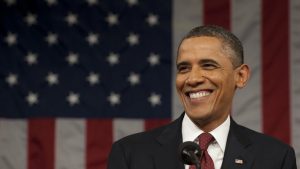I’ve had a complicated relationship with the 44th Commander in Chief.
For starters, I helped get him elected. I served on the New Media Team as a volunteer for his first presidential campaign in 2008. I got to work with some incredible people: Chris Hughes, Arun Chaudhary, Dan Siroker, Michael Slaby, Gray Brooks, and many more, all of whom went on to do extraordinary things.
 I was in Denver for the 2008 convention where, though not able to score an invite to the floor, I was able to witness an America divided by the hot button issues of the day, some of which are still with us: same-sex marriage, abortion, the war in Iraq, and immigration. I watched the DNC convention speeches with anticipation and excitement for the next eight years, fully swept up in the anti-Bush furor and pro-Obama fervor of the time.
I was in Denver for the 2008 convention where, though not able to score an invite to the floor, I was able to witness an America divided by the hot button issues of the day, some of which are still with us: same-sex marriage, abortion, the war in Iraq, and immigration. I watched the DNC convention speeches with anticipation and excitement for the next eight years, fully swept up in the anti-Bush furor and pro-Obama fervor of the time.
Despite some misgivings, I was all in on Obama. I thought his vision was the right thing for the country at the time. I thought his story, and especially his race, were poignant symbols of the progress America had made. He didn’t need to play the ‘race card’ because his candidacy was the ultimate race card. He proved to America that leadership, eloquence, savvy and hard work transcend race and class. He was also the ultimate foil to eight years of George W. Bush: the president that America loved to hate. Bush was born rich and coasted to the presidency. Obama was born poor and worked his way into it. Bush was a clumsy orator. Obama’s words soared. Bush was the voice of the special interests and the past. Obama was the voice of the disenfranchised and the future.
When we pulled the lever for Obama we believed we were making the world a better place. For a brief moment in history, Obama made us believe that Hope and Change were achievable political values. When we gathered in Grant Park in Chicago on Election Day, the minute the California polls closed and CNN flashed its projection, the crowd was so swept up in the profundity of that history-shaking moment that time seemed to freeze. I hugged a stranger that night and we cried.
As Obama would say on his way out of office eight years later, reality has a way of asserting itself. There really was no post-racial America, no progressive wave, no hope, and no change. America hated Bush enough to elect the most liberal candidate in history, and America corrected itself two years later when the Republicans took back the House of Representatives. The post-Obama swing has arguably continued into the 2016 election, bringing us the biggest wildcard in American history.
Even so, for the first couple years, I had more or less a positive feeling about Obama’s policies, and politics, until 2011 or so when my economic and political thinking took a hard libertarian tack and I found myself alienated towards my former political idol and the Democratic Party I thought reflected progress. The economy didn’t magically get better; healthcare wasn’t magically solved. I went through a personal journey that paralleled, perhaps, that of many in my generation: disillusionment, alienation, resentment, political realignment. I was probably one of many who watched with excitement and anticipation in 2009 when Congress voted on ACA, hoping that it would pass, and three years later nearly lost my mind when the Supreme Court refused to rule it unconstitutional.
Obama was still the president, but for me, for years he represented the worst of American politics. In my view, he was the face of the arrogance of Washington DC. His rhetoric that I had once praised as transcendent became bitter and divisive. He condescended to the masses with placations and platitudes and they bought it hook, line and sinker. I pulled the lever for Gary Johnson in 2012 and never regretted it.
Then, strangely enough, in 2013, my relationship to Barack Obama changed again. Living in the liberal capital of San Francisco, despite our political differences I happily partnered up with Max Slavkin and Aaron Perry-Zucker of the Creative Action Network, whose first product was a folio of pro-Obama propaganda (or as we called it, art). As their first CTO, I spent the next year creating an ecommerce and art submission platform to sell a litany of poster campaigns geared towards progressive causes with impactful results, including See America which now has a great book selling in the national parks. In San Francisco, I found myself pulled back into the progressive network of creatives and intellectuals I had spent the previous two years trying to avoid. I came to see that, despite our disagreements on many issues, their hard work to make the world a better place was admirable, and many of them continue to be close friends.
All the while, Barack Obama was my president, and the distance between us started to shrink. Second term Obama was my flavor much more than first term Obama. I admired his work on criminal justice reform. I was extremely supportive of the Trans-Pacific Partnership and watched with dismay as that fell apart. His actions on Cuba and Iran were exciting. I even cheered Kerry’s recent foray into the thorny Israeli settlement issue. I celebrated when Obama ‘evolved’ on same-sex marriage, and celebrated more so in San Francisco the week the Supreme Court ruled it constitutional. Obama wasn’t perfect by any means, especially when it came to his expansion of drone strikes, surveillance power, executive privilege, his handling of Syria, and more. But over the last three years I have developed a newfound begrudging respect for the community organizer from Illinois.
Did Obama leave me, or did I leave Obama? And once separated, did he come back to me or did I come back to him? Did he become more centrist, more pragmatic in recent years? Or did we evolve towards each other, like a divided America dancing in disagreement towards a common truth? I know that my progressive friends feel somewhat betrayed by the Obama presidency, for the same reason that my conservative friends have felt warmer towards him in recent years. Maybe we all are changing in ways we wouldn’t like to admit. Or maybe Obama, the great pragmatist, has had his finger on the pulse of our generation in a way no one ever has.
Like all presidents, he leaves office with a mixed legacy. But for me, Obama was simply my president, for better or for worse. Like postwar Eisenhower, he is the president historians will feature when they turn the page into the 21st century. I think John McCain would have made a fine president, as would have Mitt Romney. But despite all my distrust of #44 and my concerns about his achievements, I have grown accustomed to That One and will be sad to see him go. Because, for better or for worse, America is turning the page again, and though we don’t know what the next chapter will bring, this one wasn’t all that bad.
In many ways, it is impossible for me to disentangle the history of Obama with my own history. It’s impossible not to think about the most powerful person in the world–someone who is always in your living room and on your computer screen–as part of your life. And like any other relationship, mine with Obama has had its ups and downs, and must now sadly come to an end. Not sadly because change, or even Trump, are inherently bad, sadly because Obama is the president I have gotten to know through the years and now he’s about to ride off into the sunset.
So, it is with only a tinge of irony that I close this obituary of my relationship with Barack Obama, happy to see the country still standing, hopeful for the next four years, and appreciative of the accomplishments of this undeniably impressive politician and man.
Thanks, Obama.
 From
From  Something is definitely wrong when Pakistanis are rightfully protesting our government’s actions whilst we remain disturbingly silent.Never mind that the Justice Department
Something is definitely wrong when Pakistanis are rightfully protesting our government’s actions whilst we remain disturbingly silent.Never mind that the Justice Department 
 Time and time again, the courts have upheld the rights of homosexual couples to marry, and time and time again, populist movements have put an end to this basic human freedom. Today, a Federal judge issued an invalidating ruling, meaning that in California, for the time being, the only hope for defeating gay rights is in the Supreme Court. (For you constitutional purists out there, the reason we have courts in the first place is to provide guidance on law and prevent unjust laws when we don’t know any better.)
Time and time again, the courts have upheld the rights of homosexual couples to marry, and time and time again, populist movements have put an end to this basic human freedom. Today, a Federal judge issued an invalidating ruling, meaning that in California, for the time being, the only hope for defeating gay rights is in the Supreme Court. (For you constitutional purists out there, the reason we have courts in the first place is to provide guidance on law and prevent unjust laws when we don’t know any better.)